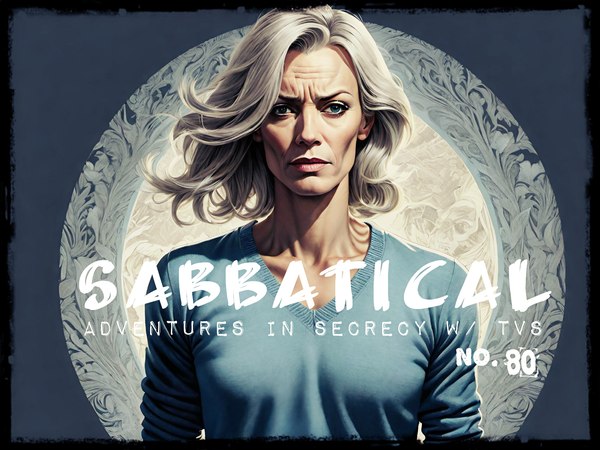On Greatness
Hey, y’all. So we’re in week six of this newsletter experiment, and it’s been boggy at Casa Van Santana. I’ll elaborate.
I’ve basically broken the newsletter into two sub-pubs: one (this one, in fact) that is talky and often about writing itself; and then another that’s collecting stories from Azza-Jono. They’re designated AIS (Adventures in Secrecy) and AJ (Azza-Jono) accordingly. The AJ stuff is going swimmingly. But AIS is proving more cumbersome. Essentially the topics that I’m interested in are turning out to be more complex and time-intensive than the early ones, so I’m stuck with the odious choice of writing more simply (and arguably giving shallower treatment to subjects) or just working on each of them, and they take as long as they take. This ish is a stab at a compromise, an introduction, if you will, of what may become a recurring theme. That, or a half-baked rant about a topic worthy of more serious examination. We’ll see!
Let’s dive in, shall we …
Teresa On Greatness
Greatness. Jfc, where to begin on this one. The first thing that springs to mah mind is: “Whatchu mean?” Like, what are we talkin’ about here? Greatness according to who? And why do we care what those fucks think, anyway? But that’s me being a bee, right? So, like, lemme slow down and take it apart, m’kay.
The time you find yourselves in—the 21st Century—that’s a fascinating time to me. Y’all that have been with me awhile know this, right? Like, my whole brand is built on that. Looking back, it’s pretty plain that it’s an interpretive period, right. Like there’s so much information being linked, archived, and reviewed that no one really had much of a chance to assimilate it all in a single lifetime, yet for some reason that was really important to a lot of folks. Assimilation is the natural enemy of diversity, yet they can and do form alliances. More on that later. You know, probably, if I still have coffee.
So you know me. Let’s define what we mean …
Greatness is …
If we were to flip to Oxford, the only evidence-based dictionary on hand at the time under discussion, we’d find this:
the quality of being great, distinguished, or eminent.
Thanks Oxford. That narrows it down.
Yet I think it does immediately showcase one of the inherent problems of defining it. It’s not simply about being great; it’s also about being distinguished or eminent; and, a gal could speculate, any combination of the three.
I’m not going to quote the whole of ‘great’ from the dictionary. We’ll get to that definition another way. But I’ll do that for the other two, which are more specific words to begin with.
Here’s distinguished:
successful, authoritative, and commanding great respect.
Begs a few questions straight away, yeah? Successful according to who? How does one come to be seen as an authority? And what commands respect? (contrast with demands respect, if ya like).
Here’s eminent:
(of a person) famous and respected within a particular sphere or profession.
Fame rears its ugly head. But we also have respect, which is genuinely important.
How’d We Get Here, T?
Good question, You! Yesterday in one of Elle Griffin’s literary salons, she posed this question: “Can art really be great if no one else thinks so?”
You can hippity-hop on over there (and I suggest you do), read the 100+ comments, and make up your own damn mind, but I’ll give you my takeaways from that discush.
Opinions seem to range a few bandwidths, which I’ll characterize as: yes, no, all art is great, no art is objectively great and its all subjective.
The Yesses
Mainly the folks who answered ‘yes’ seemed to believe that art can be great irrespective of any given opinion or body of decision-makers. While no one really went into it, it seemed like some assumptions here might be that opinion is relative to fact, and that both fact and opinion change over time and place, and therefore appraisal changes, too.
The Noes
Of which Elle herself was one, the people who said ‘no’ to the question laid their view mainly on consensus; that is, something (and presumably someone or someplace, as well, like, all nouns) are only great if a collective says so. It was not clear who comprises the collective, the necessary size, influence, or cultural status of the assessors, nor what happens if they come into conflict with one another (you know, when they don’t agree) or—this one was the one that nags me—if such a group declares something great when clearly it isn’t.
All Art is Great
A subtype of the yesses, a few folks maintained that all art is great; that’s what makes it art—presumably in contrast to entertainment or whatever, but that wasn’t stated. This seems a sensible assertion to moi, but leads into the art v entertainment nightmare topic, so we’ll move on for now.
No Art is Objectively Great Cos It’s All Subjective
This is the beauty is in the eye arg, right? It’s all a matter of opinion—and by all, they meant all, not just greatness, but certainly including that.
If these positions look familiar, you get a gold star! You’ve effectively got an array of answers that flow from the history of Western philosophical thought dating back to Socratic Greece at minimum.
Rather than give y’all an Intro to Western Philosophy course, let’s look at one other facet that wasn’t really represented, and one that was but didn’t go anywhere … well, hasn’t yet, anyway.
The Effect and Opinion of Publishers
Shockingly absent was the influence, tastemaking, and gatekeeping of traditional publishing. We see a similar thing in other art forms: the gallery system, the studio system, the record label system. These are, in their best form, guilds that enrich, encourage, and develop a culture’s art forms. At their worst—and yeah, I think you can infer my opinion here—it’s exploitation of art (and entertainment) and therefore artists themselves by the rich.
Oh sure, they’ll pitch it to you like a partnership, and for someone like Brandon Sanderson or Stephen King that’s probably more or less true. But if you’re not a top earner, you’re a serf. (That’s not an exaggeration in fiction, but is probably an overstatement in nonfiction.) Why? Because it’s about profit. This is when editors will get their feathers ruffled, but they’re really just middle management in a large corporation. And corporations have a duty to deliver maximum profits to their shareholders. Yay, capitalism!
And yes: there are outliers. Anyone can point to a runaway success title that seemed to dark horse its way to greatness—and nigh-immeasurable sales. Malcolm Gladwell wrote a book examining this called Outliers. Rather than write a book report about it, I’m gonna suggest you just read it. The tl;dr is that success—greatness, especially—is the product not of great skill or merit, hard work, or quality, but of hidden advantage.
“Hmmm,” you say. “T, that sounds a lot like …”
Privilege
Again, I’m not gonna walk you through the whole thing that is this concept of societal privilege, merely suggest that you start with W.E.B Du Bois (who first applied it to Whiteness) and then check out Peggy McIntosh (who brought it into gender), and you’ll be well on your merry way.
And I won’t belabor this point because most folks who are likely to be reading this know what I mean already. It’s no secret really that social advantages in 21C ‘Murica flow from Whiteness, maleness (especially the absence of femininity), cisness (meaning being cisgender and gender conforming), patriotism and nationalism, alignment with capitalism (and equally important: decrying of communism and socialism), being Christian (especially Protestant, more specifically Episcopalian), coming from a ‘great’ family of ‘good pedigree’, attending ‘prestigious’ schools and universities (and eschewing ‘dirty work’ such as trades), and being straight (at least publicly heteroromantic) and affirming heteronormativity (and equally important: ignoring and marginalizing anything remotely queering of the traditional man-woman-child family unit). How many of those apply to you? They’re not equally weighted in all cases, but it’s a safe bet that the more that do, the more likely you are to be deemed ‘great.’
This aspect was only mentioned in passing a couple of times, and no one really drilled into it—most didn’t even acknowledge it. Draw your own conclusions about what that might mean.
Let’s had back to shore …
A Culture Is Self-Affirming
The stories that are considered ‘great’ are, imho, those that affirm a group’s extant identity. Yes, on the surface they may pose a challenge to it, but that becomes the essence of drama, as it were, something to be overcome by the protagonist, which is the culture itself.
So your shot at ‘greatness’ is going to be in many ways directly proportionate to your alignment with the culture that is appraising it. I think it’s pretty obvious that you needn’t be from a given culture to be praised and lauded by it; and that some of the best exemplars of a culture may be dismissed as boring or uninteresting. But you can’t fuck with it too much, or it feels threatening, weird, and unsettling.
But take heart, gentle readers! There is another path to greatness …
Seeking Mastery
If we apply a basic Buddhist method of setting aside care and concern for the struggles of the world while we write and simply seek to master ourselves and our art, then we have a genuine shot a doing something worthy of greatness. Will it become great? Who knows. Will it remain great? In Buddhist philosophy everything is impermeant and gets swept away, so the answer is a hard ‘no,’ but then nothing does. Mastery of oneself and the cultivation of mental perfection does persist much longer, though, because it is the pathway to cultivating consciousness, which doesn’t rely on any one being (or work of art) to continue. So let’s do that! Let’s clear our minds of any delusions of grandeur or cultural enslavement contract and instead make great art and share it with one another as a means of spreading joy, happiness, and wisdom.
Xoxo,
T
AIS 0009





